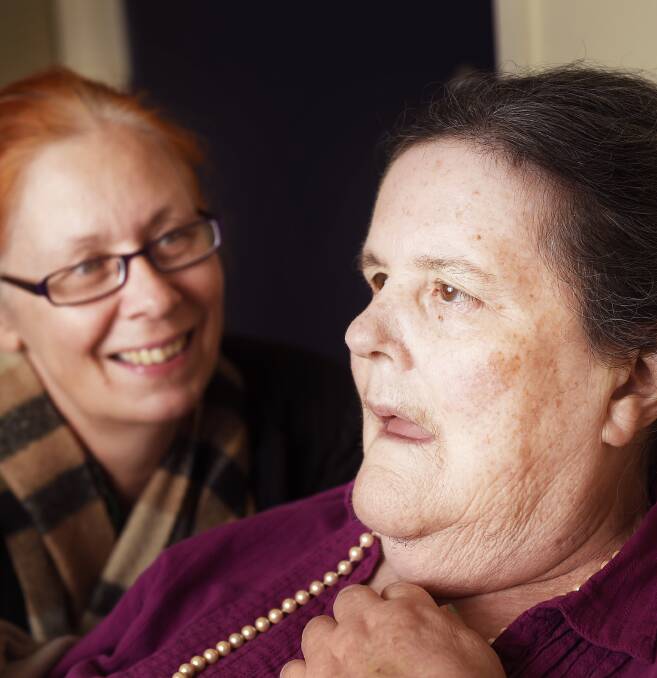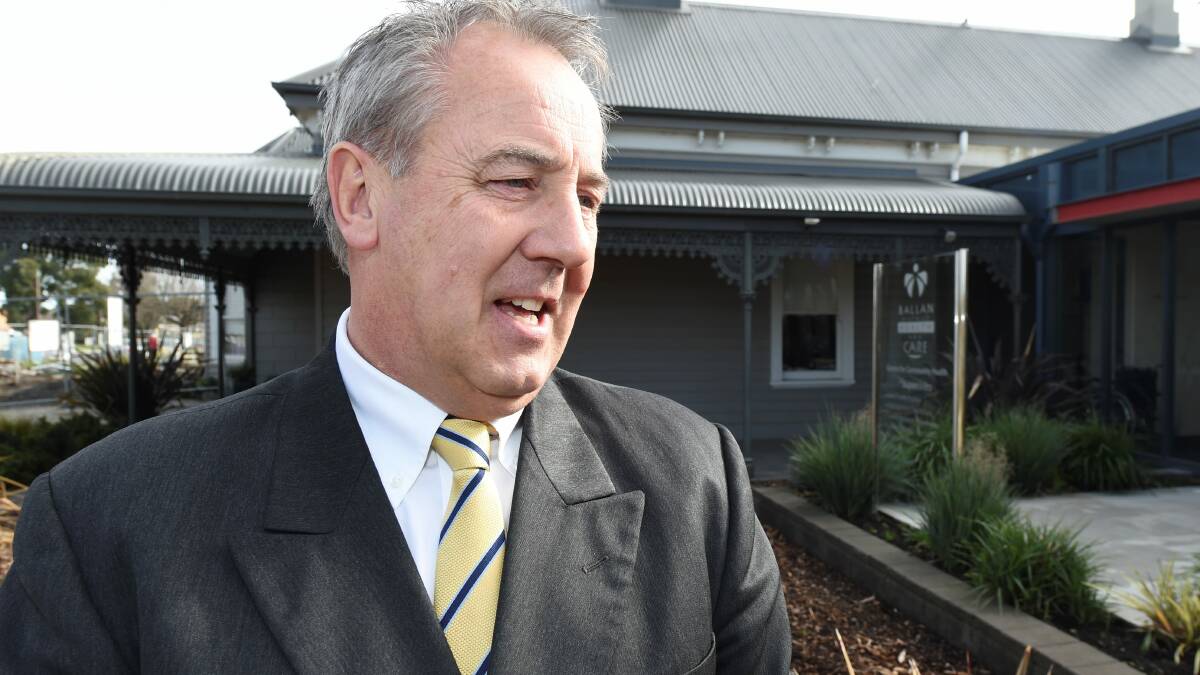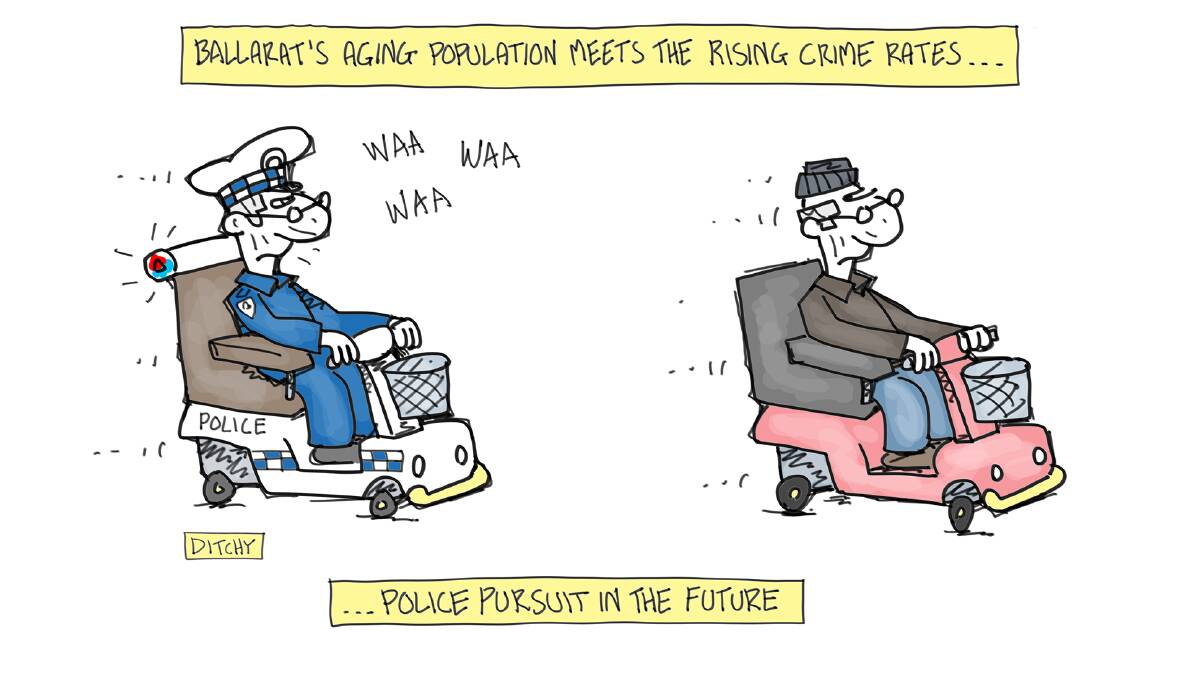Taine Usher languished on a waiting list for four years before getting a bed at Ballan Nursing Home two weeks ago.
Subscribe now for unlimited access.
$0/
(min cost $0)
or signup to continue reading
The 68-year-old was born with an intellectual disability and four years ago was diagnosed with dementia.
After a major psychotic episode in 2012 Ms Usher was forced to move from the Geelong group home she had lived in for more than 20 years to a secure facility in North Melbourne.
She was on the waiting list for Ballan Nursing Home from the time of her episode until this month, when a bed unexpectedly became available.
Her sister Tor Roxburgh, who lives at Ballan and works at the local hospital, said moving to Bal there was the closest Ms Usher had been to living with family since going into care at 12 years old.

“I can visit her several times a week, if there’s any problem this is my home community,” Ms Roxburgh said.
“It means that I personally know the doctors, and I know the staff members, they’re my friends and neighbours.
“She’s visited and she’s treated like a community member, an important community member and I can’t tell you what a difference it makes for me just to be able to see her. It’s the first time since she moved to Geelong that I live in the same city as her.”
The move to Ballan was the third for Ms Usher this year after the North Melbourne nursing home she lived in closed, giving the family just six weeks to find an alternative.
She moved to a home in Prahran but suffered a seizure which her sister thought could put her on the brink of another mental health episode.
“I had a difficult decision to make because that would be two moves in one year for my sister but at the same time it meant that if she’s here, I live one block away,” Ms Roxburgh said.
Prior to Ms Usher moving to Ballan her family, which includes another sister at Barwon Heads, were only able to visit sporadically.
“I felt terrible,” Ms Roxburgh said.
“To visit your sister once every six weeks, it’s not really good enough because she’s like a child and she adores seeing family and I feel really ashamed that I saw her so infrequently.”
Ms Roxburgh said local aged care services were vital for the well being of elderly people in regional and remote communities.
“People maintain their likes and dislikes and their culture when they move into aged care so why should you have to be sent off somewhere where they’ve got no emotional relationship with the location.
“People I believe do better in terms of their health and mental well-being if they can continue their aged care in their own community.”
Shortage causes bed block
A bed shortage at Ballan Nursing Home has caused bed blocking at the hospital, Ballan District Health Care chief executive Wayne Weaire said.
Ballan District Health and Care’s 10 hospital beds were occupied by an elderly person needing to go into the nursing home 80 per cent of the time, he said.
Renovations to Ballan’s hospital and community health care facilities were completed in 2014 but the nursing home, which was built in 1992 and opened by then member for Ballarat Mark Ronaldson, has yet to be upgraded.
“We’ve been quite often stuck with being unable to take patients because our beds have been occupied by very frail elderly aged care people who ought to be in aged care, not in hospital taking up that vital resource,” Mr Weaire said.
“At one stage the week before last we had four of our hospital beds taken up with people who needed to go into the nursing home.”

Ballan Nursing Home had been “walked past” by state and federal governments, Mr Weiare said.
The home has applied six times for federal funding and twice for state funding in the last two-and-a-half years without success, including two applications for federal funding this year.
Applications included an expansion from 52 beds to 100, to accommodate a waiting list which over the last five years has averaged been between 28 and 32 people, Mr Weaire said.
He said the not-for-profit’s facilities needed to be upgraded within the next five years or residents in need of higher level care would have to go elsewhere.
“The beds that have been allocated in our region have been going to new for profit rather than existing, not-for-profits.
“We’ve got a very long history of maintaining a social safety net and infrastructure in our community for those who previously haven’t been able to afford aged care or having been able to be cared for in other ways and we have been consistently walked past.”
Last year’s Aged Care Approvals Round allocated 48 ages care places to Equisent Aged Care in Ballarat and 24 to Brickworks Aged Care at Bacchus Marsh as well as nine home care places to EGHS at Home at Ararat.
The ACAR received 28 applications for home and aged care places from the Grampians region.
A spokesperson for Federal Health Minister Sussan Ley said Ballan Nursing Home was provided with individual feedback on their application to make them more competitive in future rounds.
Ballarat MP Catherine King said she was disappointed the service had been “overlooked” by the federal government would continue to lobby for funding.
Plan ahead for aging population: LAS
A dramatic increase in Ballarat’s senior population by 2031 has been downplayed by the state government, Australia’s peak body for age service providers said.
The government’s Victoria in the Future 2016 report released last week showed Ballarat’s over 65 population is expected to increase by 143 per cent, the fourth biggest rise after greater Melbourne, Geelong and Bendigo.
Leading Age Services Australia CEO Sean Rooney welcomed the report but said it failed to highlight the overall increase to the aged population of almost 180 per cent statewide.
“An increasing ageing population requires sufficient planning to ensure the right policy settings will deliver the required retirement villages, residential aged care, home and community care, and infrastructure to meet future needs,” he said.

A report into aged care financing in regional and remote aged care service providers released earlier this year found the services were “unviable” based on data for 2014-2015, which revealed they were losing $2004 per resident annually.
The operating result for Victoria and Tasmania combined was the lowest nationally.
Victoria’s Minister for Ageing Martin Foley said the government was ensuring access to high quality care outside major cities.
“We hope now we can work in partnership with the Turnbull government on how they can restore the cuts they made over the last two Federal budgets which threatened the viability especially for rural and remote services,” Mr Foley said.
A spokesperson for federal Health Minister Sussan Ley denied cuts had been made to aged care and said funding had increased by more than $3 billion.
“The number of beds and packages is increasing every year … with funding for the overall aged care sector continuing to grow by a further 7 per cent per year.”



